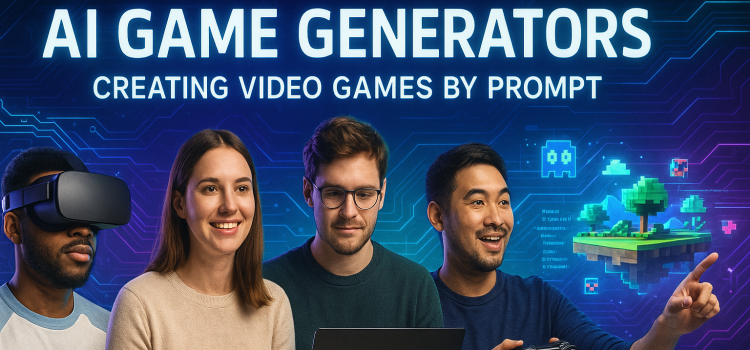
Introduction
Video games have evolved tremendously over the years, with game development now requiring sophisticated skills, knowledge, and powerful software. However, recent advancements in artificial intelligence (AI) have begun to revolutionize the process. AI game generators are now allowing anyone, regardless of their technical skills, to create video games simply by providing a prompt. This is an exciting development tool, making game creation more accessible and democratizing the world of video game development in gaming industry.
In this article, we’ll dive into what AI game generators are, how they work, and how they’re shaping the future of wide range video game creation. Whether you’re a beginner, hobbyist, or professional, AI-driven game generators are offering new ways to explore game design. Let’s discover how these tools work and how you can start creating games with just a few commands.
What is an AI Game Generator?

An AI game generator is a tool or software that uses artificial intelligence to help create video games. Traditionally, making a video game involves writing code, designing game assets, and using complex game engines. However, AI game generators simplify this process by allowing users to generate video games with minimal input.
These tools use machine learning algorithms to understand the user’s prompts and automatically generate game elements like characters, environments, gameplay mechanics, and even storylines. Instead of manually programming a game, users can input specific commands, and the AI handles the rest.
The beauty of AI game generators is that they allow anyone—whether you’re a game designer, writer, or even someone with no gaming experience in coding—to create engaging and interactive video games. The AI makes game development easier, faster, and more efficient, allowing for rapid prototyping and iteration.
How Do AI Game Generators Work?

AI game generators work by leveraging machine learning algorithms and large datasets to automatically generate game content. Here’s a simplified breakdown of how they function:
1. User Input: The process begins when the user provides the AI with a prompt or a set of instructions. This could be as simple as a genre (e.g., RPG, platformer, puzzle) or a more detailed description of the game’s setting, characters, and gameplay mechanics.
2. AI Interpretation: The AI analyzes the input and begins generating the appropriate assets for the game. This includes:
- Game mechanics: The AI determines how the game will play and what rules govern the game’s progression.
- Characters and assets: The AI may generate or pull from an existing library of characters, objects, and environments.
- Story elements: For narrative-driven games, the AI might generate dialogues, quests, and other story elements.
3. Game Assembly: The AI then assembles the game by stitching together the generated assets. It will handle everything from the game’s design to the physics and interactions between different elements. Depending on the AI tool, it may also allow you to tweak specific aspects of the game after it’s generated.
4. Testing and Iteration: Some AI game generators allow for immediate testing of the created game. If you don’t like certain elements, you can modify the prompt, and the AI will generate a new version. This iteration process makes it easier to refine ideas and perfect the gameplay.
AI game generation tools can make video game development a faster and more accessible process, especially for those who lack technical knowledge in programming.
Key Benefits of Using AI Game Generators

AI game generators are revolutionizing how video games are made. Here are the main benefits of using AI-driven tools for game development:
1. Accessibility for Non-Programmers
AI game generators make game development accessible to people who don’t have programming skills. This opens the door for creators, artists, and writers who may have great ideas for games but lack the technical skills to build them. With AI, anyone can bring their ideas to life with just a few prompts.
2. Speed and Efficiency
Creating a game traditionally can take months or even years. With AI game generators, the process becomes much faster. What would normally take hours of programming and testing can now be done in a fraction of the time. AI tools can instantly generate gameplay mechanics, characters, and environments, allowing creators to focus on the creative aspects.
3. Cost-Effective
Developing video games typically requires large development teams, artists, and designers. Using an AI game generator eliminates the need for a full team, making game development more affordable, especially for indie game developers. It also reduces the cost of licensing assets, as the AI can generate its own.
4. Rapid Prototyping
For developers working on a new idea, AI game generators allow for rapid prototyping. If you have a game idea but aren’t sure how it will play out, you can quickly generate a prototype and test it. This helps streamline the development process, allowing you to experiment and iterate more easily.
5. Creative Freedom
While AI generates the basic structure of the game, it’s up to the creator to add their personal touch. You still have the freedom to fine-tune the game’s design, adjust elements, and make creative decisions. AI game generators provide a strong foundation, allowing you to focus on the elements that matter most to you.
Popular AI Game Generators

There are several AI game generators on the market today. Below are some of the most popular and innovative platforms that allow users to create games quickly and easily:
1. Promethean AI
Promethean AI is an AI-driven game level design tool designed to help developers build and populate virtual worlds. It uses machine learning to automatically generate environments and assets based on simple prompts. It’s widely used for creating game environments, landscapes, and 2D and 3D game models.
2. Gamefroot
Gamefroot is an online platform that uses AI to allow creators to develop 2D games. It’s designed to be user-friendly, with drag-and-drop functionality and AI-powered assets. Gamefroot is a great tool for beginners who want to make simple games without any coding knowledge.
3. DeepMind by Google
Google’s DeepMind has explored using AI for various aspects of game development, including generating strategies for games like StarCraft II. While not strictly a “game generator” in the traditional sense, it shows how AI can improve game development by learning from gameplay patterns and optimizing strategies.
4. AI Dungeon
AI Dungeon is an interactive storytelling platform powered by AI. While it’s not a traditional game generator, it allows users to create dynamic, text-based adventures by simply providing prompts. The AI generates responses and storylines, creating a unique narrative each time you play.
5. GDevelop
GDevelop is an open-source game development platform that uses AI to assist in creating 2D games. It’s beginner-friendly and doesn’t require programming knowledge. The AI helps automate certain tasks, making game creation faster and easier.
Challenges of Using AI Generators
Despite their power, AI game tools face real hurdles today. Generated content can feel repetitive or mismatch your vision, requiring manual editing to fix odd glitches. Large AI models demand strong internet connections or costly cloud credits, which may limit access for small teams. Licensing and copyright issues arise if the AI’s training data includes copyrighted game art or music. Finally, relying too heavily on AI risks losing a game’s unique “human touch,” so developers must strike a balance.
Future of AI-Driven Game Creation

Looking ahead, AI game generators will become smarter and more collaborative by 2025 and beyond. We expect real-save time co-creation, where you adjust a level’s terrain with voice or gesture while the AI refines assets on the fly. Integrated toolchains may let AI handle audio mixing, quality testing, and performance optimization automatically. As models learn from user feedback, they’ll produce more varied, high performance or high-quality content with fewer prompts. In this way, AI will reshape game creation into a faster, more flexible, and richly creative process for developers of all sizes.
Comparative Table: Popular AI Game Generators
| Tool | Platform | Features | Best For | Price |
|---|---|---|---|---|
| Promethean AI | PC/Cloud | AI-driven environment creation, asset generation | 3D world-building and environments | Subscription-based |
| Gamefroot | Web-based | Drag-and-drop interface, AI-powered assets | 2D game creation, no coding required | Free, Premium Options |
| DeepMind (Google) | PC, Cloud | AI-driven gameplay optimization and strategy development | Advanced AI learning for games | Paid, Enterprise |
| AI Dungeon | Web-based, Mobile | Text-based interactive storytelling, AI-powered narrative generation | Story-driven, text adventure games | Free, Premium Subscriptions |
| GDevelop | PC, Web-based | No coding, drag-and-drop, AI tools for automation | 2D games, easy learning for beginners | Free, Premium Options |
Conclusion
AI game generators are revolutionizing the way video games are created, making the process faster, easier, and more accessible. With AI tools, anyone can create games by simply providing a prompt, without needing extensive coding skills or a big team. These tools open up new possibilities for creators, offering speed, flexibility, and creativity.
As AI continues to evolve, we can expect even more powerful game creation tools that push the boundaries of what’s possible. Whether you’re a hobbyist, indie developer, or professional, AI game generators are changing the game development landscape, offering opportunities to explore your creativity like never before.








